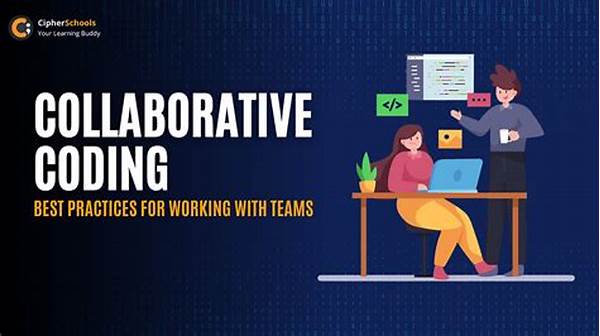In the realm of software development, collaborative coding projects have become a cornerstone for innovation and progress. However, these projects are not without their challenges. This article seeks to explore the myriad issues that can arise when multiple developers work together on a coding project. Understanding these challenges is vital for the successful execution and completion of software projects, especially in dynamic and diverse team environments.
Read Now : Corporate Employee Training Solutions
Communication Barriers
Communication is an essential element of any successful collaboration, yet it remains one of the primary challenges in collaborative coding projects. Misunderstandings may occur due to differences in time zones, communication styles, or cultural backgrounds. These barriers can lead to inefficiencies and errors in the development process. Additionally, the lack of real-time feedback mechanisms can result in delays and misalignment of project goals. To address these issues, it’s crucial to establish clear communication channels and protocols. Teams must leverage collaborative tools that bridge communication gaps and enable seamless interaction across geographical boundaries. By fostering an inclusive communication culture, teams can mitigate the challenges posed by communication barriers in collaborative coding projects.
Coordination Complexity
Coordination complexity in collaborative coding projects can prove to be a substantial challenge. As projects often involve multiple components and contributors, aligning everyone’s work to create a cohesive end product requires meticulous planning and ongoing synchronization. This complexity is heightened when dealing with continuous integration and diverse version control systems. Effective project management practices, such as iterative development processes and regular check-ins, become essential. Utilizing agile methodologies can help organize tasks and ensure that the collective efforts of all contributors are well-coordinated and moving towards the same objectives. It is imperative that tools used for project management are robust, intuitive, and support clear visibility of progress for all team members.
Version Control Issues
Version control systems (VCS) are indispensable for collaborative coding projects, yet they also present challenges that cannot be overlooked. Conflicts often arise when multiple developers make concurrent changes to the same part of the project. These conflicts can lead to time-consuming resolution processes and may disrupt the overall workflow. Furthermore, improper use of VCS can result in detrimental impacts, such as loss of code or project regression. To circumvent these issues, teams must adopt strict version control practices, including frequent commits and thorough code reviews. Training sessions on the effective use of VCS tools can equip team members with the skills necessary to manage changes adeptly, ensuring the integrity and continuity of the project.
Tool Selection
The selection of tools in collaborative coding projects is a critical decision that affects the entire development lifecycle. The right set of tools can streamline communication, enhance productivity, and facilitate smoother workflow management. However, the abundance of available tools can create confusion, leading to inconsistency in usage and integration challenges. It’s essential to evaluate tools based on the specific needs of the project and the expertise of the team. Criteria such as scalability, compatibility with existing systems, and support for remote collaboration play significant roles. A well-thought-out tool selection process can significantly reduce the difficulties faced in collaborative coding projects by ensuring that all stakeholders have access to a cohesive and effective suite of technologies.
Cultural Differences
Cultural differences in collaborative coding projects can pose considerable challenges. The diversity in cultural backgrounds can affect team dynamics, decision-making processes, and communication styles. While cultural diversity can be a source of innovation and creativity, it can also lead to misunderstandings and conflicts if not managed properly. It is important for team leaders to foster an environment of inclusivity and appreciation for different perspectives. Sensitivity training and cross-cultural communication workshops can help team members better understand and respect each other’s cultural nuances. By addressing cultural differences proactively, teams can harness the strengths of their diverse backgrounds and minimize the potential for friction and discord.
Read Now : Achievement-oriented Feedback Approaches
Conflict Management
Conflict management is a pivotal component in successfully navigating collaborative coding project challenges. Disagreements, whether technical or interpersonal, can impede project progress and morale. Effective conflict resolution strategies must be in place to ensure that disputes are addressed swiftly and constructively. This involves creating an open environment where team members feel comfortable voicing their concerns. Regular check-ins and feedback sessions can provide a platform for airing grievances and finding common ground. Facilitation by a neutral third party or professional mediator can also be beneficial in more severe cases. The ultimate goal in conflict management is to transform potential obstacles into opportunities for growth, ensuring that the team remains cohesive and focused on the project’s success.
Maintaining Motivation
Maintaining motivation in the face of collaborative coding project challenges is vital for sustaining productivity and creativity. Prolonged projects, with their inherent complexities and setbacks, can diminish enthusiasm among team members. Frequent recognition of achievements and contributions can bolster morale. Encouraging a sense of ownership and aligning individual goals with those of the project can foster intrinsic motivation. It is also beneficial to promote a work environment that supports work-life balance, as burnout can severely impact motivation levels. By implementing motivational strategies, teams can better navigate the complexities of collaborative coding projects, ensuring a committed and engaged workforce striving towards common objectives.
Executive Summary
In conclusion, collaborative coding project challenges encompass a wide array of issues, from communication barriers and coordination complexity to cultural differences and tool selection. Each challenge presents unique complexities that require strategic planning and agile management. By understanding and addressing these challenges proactively, teams can create an environment that supports effective collaboration, harnesses the collective expertise of its participants, and drives successful project outcomes. Ensuring that open communication, effective conflict management, and mutual respect underlie every interaction will greatly enhance the potential for project success. Collaborative coding projects, while challenging, offer rich opportunities for learning and innovation when managed with diligence and foresight.
